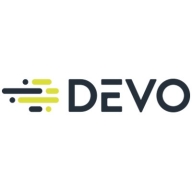

Splunk Enterprise Security and Devo are both key players in the data analytics and threat detection category. Splunk is often favored for its extensive integration capabilities and is more suitable for complex cybersecurity needs, while Devo is recognized for its ease of use and real-time analytics through Activeboards.
Features: Splunk Enterprise Security is known for its integration capabilities, risk-based alerting, and threat intelligence, offering customizable dashboards that are beneficial for comprehensive threat alerts. Devo excels with its Activeboards for real-time analytics, providing efficient data handling and simplified visual analytics that make it user-friendly. Additionally, Devo's capability to manage 400 days of hot data strengthens its offering.
Room for Improvement: Splunk users seek enhancements in operational workflow, its graphical user interface (GUI), and more straightforward user access controls, along with better overall documentation. Devo needs to improve its monitoring capabilities, enhance its reporting tools, and provide more customizable solutions to facilitate easier deployments.
Ease of Deployment and Customer Service: Splunk supports various deployment models, offering flexibility but notably presents a steep learning curve and inconsistent customer service experiences. Devo's cloud-native architecture is appreciated for being straightforward, although customization is sometimes necessary for specific enterprise needs.
Pricing and ROI: Splunk is considered a high-end investment, seen as a premium offering due to its comprehensive features and providing significant ROI for enterprises. Devo's pricing model is based on data ingestion and is considered cost-effective, offering good value and predictability, although some users have reported unexpected costs related to metadata processing.
The documentation for Splunk Enterprise Security is outstanding. It is well-organized and easy to access.
We couldn't calculate what would have been the cost if they had actually gotten compromised; however, they were in the process, so every investment was returned immediately.
On average, my SecOps team takes probably at least a quarter of the time, if not more, to remediate security incidents with Splunk Enterprise Security compared to our previous solution.
We have paid for Splunk support, and we’re not on the free tier hoping for assistance; we are a significant customer and invest a lot in this service.
I have had nothing but good experiences with Splunk support, receiving timely and helpful replies.
We've had great customer success managers who have helped us navigate scaling from 600 gigs to 30 terabytes.
We currently rely on disaster recovery and backup recovery, which takes time to recover, during which you're basically blind, so I'm pushing my leadership team to switch over to a clustering environment for constant availability.
They struggle a bit with pure virtual environments, but in terms of how much they can handle, it is pretty good.
It is easy to scale.
They test it very thoroughly before release, and our customers have Splunk running for months without issues.
Splunk has been very reliable and very consistent.
It provides a stable environment but needs to integrate with ITSM platforms to achieve better visibility.
This is particularly evident when dealing with failed login attempts and determining true versus false positives.
Improving the infrastructure behind Splunk Enterprise Security is vital—enhanced cores, CPUs, and memory should be prioritized to support better processing power.
Splunk Enterprise Security is not something that automatically picks things; you have to set up use cases, update data models, and link the right use cases to the right data models for those detections to happen.
For any future enhancements or features, such as MLTK and SOAR platform integration, we need more visibility, training, and certification for the skilled professionals who are working.
I saw clients spend two million dollars a year just feeding data into the Splunk solution.
The platform requires significant financial investment and resources, making it expensive despite its comprehensive features.
I find it to be affordable, which is why every industry uses it.
When they see a spike in a line chart for a failed login, which could be a true or false attempt, they can click that spike, and a table widget on the same active board instantly populates with raw logs of data for those specific failed logins.
This capability is useful for performance monitoring and issue identification.
I assess Splunk Enterprise Security's insider threat detection capabilities for helping to find unknown threats and anomalous user behavior as great.
Splunk Enterprise Security provides the foundation for unified threat detection, investigation, and response, enabling fast identification of critical issues.
| Product | Market Share (%) |
|---|---|
| Splunk Enterprise Security | 8.7% |
| Devo | 1.0% |
| Other | 90.3% |


| Company Size | Count |
|---|---|
| Small Business | 8 |
| Midsize Enterprise | 4 |
| Large Enterprise | 11 |
| Company Size | Count |
|---|---|
| Small Business | 110 |
| Midsize Enterprise | 50 |
| Large Enterprise | 257 |
Devo is the only cloud-native logging and security analytics platform that releases the full potential of all your data to empower bold, confident action when it matters most. Only the Devo platform delivers the powerful combination of real-time visibility, high-performance analytics, scalability, multitenancy, and low TCO crucial for monitoring and securing business operations as enterprises accelerate their shift to the cloud.
Splunk Enterprise Security delivers powerful log management, rapid searches, and intuitive dashboards, enhancing real-time analytics and security measures. Its advanced machine learning and wide system compatibility streamline threat detection and incident response across diverse IT environments.
Splunk Enterprise Security stands out in security operations with robust features like comprehensive threat intelligence and seamless data integration. Its real-time analytics and customizable queries enable proactive threat analysis and efficient incident response. Integration with multiple third-party feeds allows detailed threat correlation and streamlined data visualization. Users find the intuitive UI and broad compatibility support efficient threat detection while reducing false positives. Despite its strengths, areas such as visualization capabilities and integration processes with cloud environments need enhancement. Users face a high learning curve, and improvements in automation, AI, documentation, and training are desired to maximize its potential.
What Are the Key Features of Splunk Enterprise Security?In specific industries like finance and healthcare, Splunk Enterprise Security is instrumental for log aggregation, SIEM functionalities, and compliance monitoring. Companies leverage its capabilities for proactive threat analysis and response, ensuring comprehensive security monitoring and integration with various tools for heightened operational intelligence.
We monitor all Security Information and Event Management (SIEM) reviews to prevent fraudulent reviews and keep review quality high. We do not post reviews by company employees or direct competitors. We validate each review for authenticity via cross-reference with LinkedIn, and personal follow-up with the reviewer when necessary.